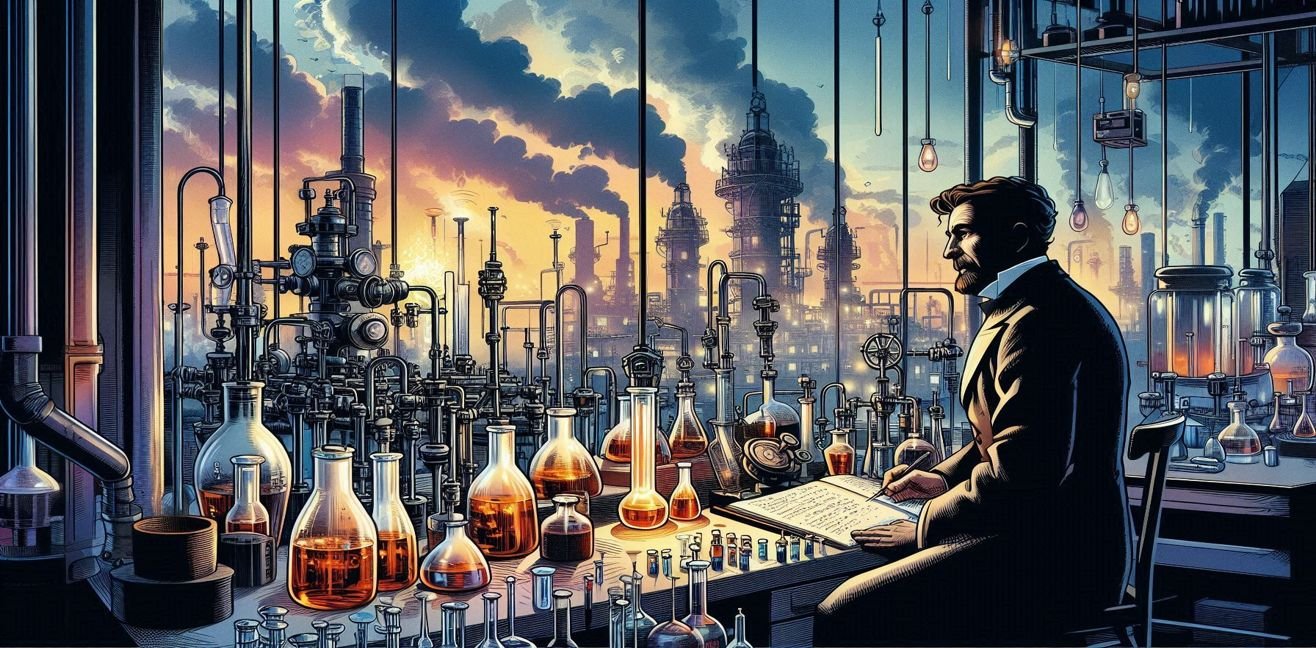Imagine… the early 20th century, a laboratory filled with glass bottles, steam rising, smoke swirling everywhere… And in the middle of it all, there’s a man: Friedrich Bergius. Germany’s pride, a fearless pioneer of chemistry, the master of pressure! 🌟
Bergius’s story isn’t your typical “one day I walked into a lab and won a Nobel” tale. Oh no, my dear, this story is about courage, innovation, a love for science, and a little bit of “I can make this happen” attitude. Born in 1884, when Bergius started studying chemistry, nobody really knew what could be done under high pressure. And that’s exactly where Bergius stepped in, filling the gap and revolutionizing the world of chemistry.
🧪 High-Pressure Chemistry: Bergius’s Revolution
Bergius’s most famous discovery was high-pressure chemistry. Simply put: for a reaction to happen, chemicals alone aren’t enough; sometimes you have to squeeze them and say, “Come on, change already!” And that’s exactly what Bergius did.
🔹 Producing Liquid Fuel from Coal
Bergius demonstrated that coal could be converted into liquid fuel under high pressure and temperature by adding hydrogen. What started in a lab would one day lay the foundation for producing gasoline and diesel on a global scale. 🌍⛽
How did he do it?
He mixed coal powder with a catalyst, applied high pressure and temperature, and added hydrogen. The result? Solid coal transformed into usable liquid fuel.
Why was it important?
At that time, petroleum resources were limited. Bergius’s method meant countries could turn their coal into fuel whenever oil supplies were low.
🔹 Hydrogenation Reactions
Bergius didn’t stop at coal. He developed a method to convert solid or semi-solid hydrocarbons into liquids by adding hydrogen and increasing pressure. The higher the pressure, the faster the reaction, resulting in usable liquid fuel.
This method played a critical role in meeting Germany’s fuel needs during World War II.
🏭 Industrial-Scale Methods: From Lab to the World
One of Bergius’s greatest achievements was making his laboratory discoveries applicable on an industrial scale. He didn’t just work with glass bottles and test tubes; he turned his ideas into methods that could be implemented in actual production plants.
How did he do it?
After successfully converting hydrocarbons into liquid fuel under high pressure in the lab, he scaled the process up in large industrial reactors. He adapted technical details such as catalyst selection, temperature, and pressure control to make it suitable for industrial production.
Why was it important?
Scientists could now see that lab experiments weren’t just theoretical. Thanks to Bergius, discoveries could be applied in the real world for energy production, fuel supply, and industrial chemistry.
Impact:
Industrial-scale methods allowed efficient use of coal and hydrocarbon resources. Bergius ensured that scientific discoveries didn’t remain on paper but became practical solutions for humanity.
🌟 Bergius’s Other Contributions
Bergius’s influence went beyond chemistry experiments and was felt worldwide:
- Innovation in Energy: His coal-to-liquid fuel method ensured energy production even when petroleum resources were scarce.
- Contribution to Chemical Industry: He showed that reactions could be accelerated under high pressure, laying a cornerstone for chemical engineering.
- Strategic Importance: During World War II, Bergius’s methods played a critical role in Germany’s fuel strategy.
- Inspiration to Science: He demonstrated to young scientists that courage, curiosity, and determination can change the world.
🏆 Nobel Prize and Recognition
In 1931, Friedrich Bergius received the Nobel Prize in Chemistry for his work on high-pressure chemistry and hydrogenation methods. The Nobel Prize was proof that the scientific community recognized, “Your discoveries don’t just stay in the lab—they impact the world!”
But Bergius’s true legacy wasn’t the award—it was his approach to science. He showed that chemistry wasn’t just about lab experiments, and that hours of dedicated work could make a real difference for humanity.
😎 Inspiration from Bergius
Bergius’s story teaches us:
- Don’t be afraid to experiment. 💡
- Sometimes, change requires increasing the pressure; challenges are essential for success. 🔥
- Science isn’t just formulas; it thrives on passion, curiosity, and creativity. ❤️🔥
Friedrich Bergius left a mark on chemistry as a genius who danced with pressure. And he showed us that great discoveries begin with bold ideas.




